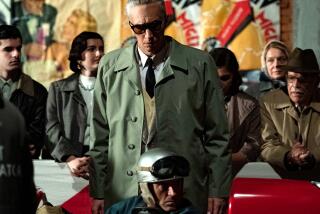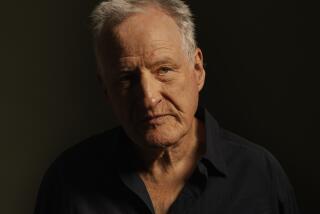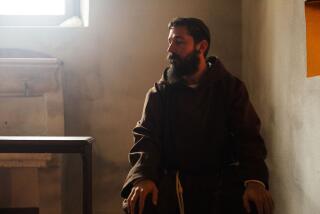A Nostalgic ‘Road’ Trip With Montand
- Share via
“The Wide Blue Road,” the debut feature of the great Italian director Gillo Pontecorvo, is more than 40 years old, but its heart is the heart of a young lion named Yves Montand.
The French star was just 36 when he made “Road” in 1957, only four years past his breakthrough performance in “Wages of Fear.” Ruggedly handsome in a black turtleneck, comfortable speaking the Italian of his parents as he casually rolls his own cigarettes, Montand is as irresistible today as the day the film was made. His involving masculine presence, the way powerful and conflicting emotions tear him apart, holds us to the screen.
Pontecorvo, best known for 1966’s “The Battle of Algiers,” has called himself “a late son of neo-realism,” and “The Wide Blue Road” fits that description perfectly. Though shot in color (albeit an obscure Italian variety called Ferraniacolor) and cast with name actors, not nonprofessionals, in the leads (“The Third Man’s” Alida Valli plays Montand’s wife), it’s very much of a politically charged melodrama. Which may be why this handsomely restored version masterminded by Milestone Film & Video is actually the project’s first American theatrical release.
Also of interest is the complexity of the character Montand plays, a fisherman living on an island off Italy’s Dalmatian coast. Squarcio is undoubtedly the hero of the piece, a good husband to his wife and understanding father to his three children, someone who helps his fellow fisherman whenever he can.
Yet he is also a stubborn loner who scorns the growing spirit of organized cooperation among his neighbors and goes about his business in a decidedly controversial way.
“The Wide Blue Road” opens with Squarcio defusing a bomb. It’s not a good deed; it’s how he acquires the gunpowder he needs to make a living from the sea.
Mocking the nets used by people like his old friend Salvatore (Spanish actor Francisco Rabal), Squarcio fishes by tossing explosive devices into the ocean and collecting the stunned and dead fish that result.
Though he’s careful not to bomb in the areas where the other islanders use their nets, and though he helps them negotiate with Natale, the unscrupulous local wholesaler, Squarcio has no interest in their dream of founding a co-op and buying their own refrigerator. His methods have lifted his family out of poverty and he will do anything to see that they don’t fall back.
But Squarcio’s fate is not entirely in his strong hands. This is neo-realism after all, a genre charged with fatalism, where individuals are invariably overmatched by social forces and where economic adversity goes hand in hand with tragedy. “Life is so difficult,” one character says, and based on the evidence shown here it’s hard not to agree.
Wouldn’t you know it but the local Coast Guard starts to get tough with Squarcio, who retaliates by buying a newer, faster engine. But he’s got to sign a stiff promissory note to afford this war of nerves. Slowly, implacably, the walls of fate start to close in.
Not surprisingly, given its vintage, “The Wide Blue Road” creaks a bit in some departments, especially as it’s setting things up. But like any person of a certain age, the film performs better once it’s warmed up, and Squarcio is fully engaged battling his myriad dilemmas.
Besides Montand’s splendid performance, “The Wide Blue Road’s” other treat is seeing a film that’s both old-fashioned enough to believe that social concerns can lead to satisfying drama and well-made enough to deliver on that belief. A film infused with that kind of passion never goes out of style.
*
Unrated. Times guidelines: adult subject matter.
‘The Wide Blue Road’
Yves Montand: Squarcio
Alida Valli: Rosetta
Francisco Rabal: Salvatore
Umberto Spadaro: Gaspare
Peter Carsten: Riva
Frederica Ranchi: Diana
A G.E.S.I. Cinematografica, Play-Art, Eichberg Film, Triglav Film production, released by Milestone. Director Gillo Pontecorvo. Producer Maleno Malenotti. Screenplay Franco Solinas, Ennio De Concini, Gillo Pontecorvo, based on the novel “Squarcio” by Franco Solinas. Cinematographer Mario Montuori. Editor Eraldo Da Roma. Costumes Lucia Mirisola. Music Carlo Franci. Running time: 1 hour, 39 minutes.
*
Nuart, 11272 Santa Monica Blvd., West Los Angeles, (310) 478-6379.
More to Read
Only good movies
Get the Indie Focus newsletter, Mark Olsen's weekly guide to the world of cinema.
You may occasionally receive promotional content from the Los Angeles Times.











